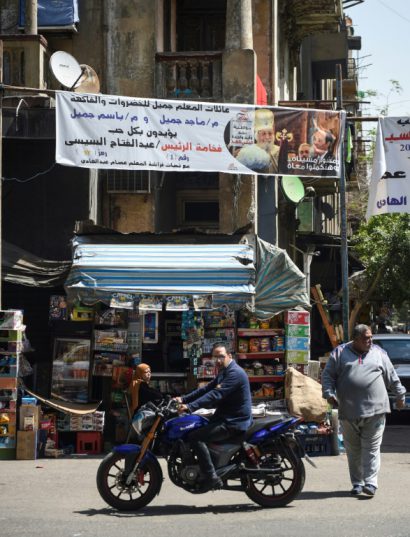On the streets of Cairo's Shubra district, many Coptic Christians -- but not all -- say they will support President Abdel Fattah al-Sisi in his re-election bid on Monday.
Pro-Sisi banners hang overhead in the neighbourhood where many Copts reside, often showing the president standing alongside Coptic Orthodox Pope Tawadros II.
“There is no other man like him… at the moment,” Edward Tawfik, a 60-year-old who runs a coffee shop in the area, told AFP as his customers smoked water pipes and played backgammon.
Sisi, who as defence minister led the 2013 overthrow of Islamist president Mohammed Morsi, was elected in 2014.
Many Christians say he rescued the country by ousting Morsi, a member of the Muslim Brotherhood, following massive protests demanding his resignation.
The former army chief, who repeatedly calls on Muslim leaders to spearhead a “renewal of religious discourse”, rarely misses an opportunity to appear alongside Tawadros.
Tawadros has repeatedly praised Sisi. Coptic Church spokesman Boulos Halim told AFP that relations between the two men are excellent, but that there has been no official endorsement of Sisi.
“We are not calling on people to vote for a particular person, but just to vote,” he said.
Sisi is running for re-election virtually unopposed in a March 26-28 poll. His only opponent, Moussa Mostafa Moussa, was relatively unknown before announcing his candidacy in late January.
All other presidential hopefuls have been arrested or withdrew from the race.
-‘Majority’ support Sisi-
Halim said a “majority” of Christians support Sisi and that the incumbent has worked to tighten security following a spate of attacks on Christians that began in 2016 and claimed by the Islamic State group’s Egypt affiliate.
While the jihadists, based in North Sinai, mainly target security forces, they have also focused on Copts.
More than 100 Christians have been killed in attacks since December 2016, when an IS suicide bomber targeted a small church in the Saint Mark’s Cathedral complex, the seat of the Coptic papacy, killing nearly 30 worshippers.
Halim also expressed the community’s appreciation for the construction of new churches.

A picture taken on March 20, 2018 shows privately sponsored election banners supporting Egyptian President Abdel Fattah al-Sisi hanging in a main street in the capital Cairo’s northern suburb of Shubra
These include Egypt’s largest cathedral, built in the heart of the country’s new capital, under construction east of Cairo. The cathedral was inaugurated during this year’s January Coptic Christmas mass, attended by Sisi and many of his ministers.
Copts, estimated to make up about 10 percent of Egypt’s population of 96 million, complain that they are sidelined from senior posts in the justice system, universities, the police, and the military.
They also have endured intermittent sectarian attacks, especially in remote and impoverished villages in southern Egypt.
– Church ‘does not represent all’ –
After Morsi’s ouster, many of his supporters accused the Christian community of supporting the overthrow.
They pointed to Tawadros’s appearance next to Sisi in July 2013, when the then army chief announced Morsi’s removal on television, even though he was also surrounded by senior Muslim and opposition figures.
Following the deadly dispersal by security forces of two pro-Morsi protest camps in Cairo in August 2013, dozens of Coptic churches, schools, homes and businesses were attacked.
Early last year, hundreds of Christians fled northern Sinai after IS killed several Christians and threatened more attacks.
But a lack of public surveys means it is difficult to precisely determine the level of Coptic support for Sisi, according to Nevine Mossaad, a political science professor at Cairo University specialising in minorities in the Arab world.
“It’s true that the majority of Copts are pro-Sisi, but some of them are against him,” he said.
“The Copts do not vote as one bloc.”
Coptic youths are particularly vocal in their opposition to the church’s connection to the regime.
“The Church does not represent all Christians,” said activist Bishoy Tamri, a member of the Maspero Youth Union, a Coptic human rights organisation born in the wake of the January 2011 protests that toppled longtime ruler Hosni Mubarak.
“We reject the church’s exploitation for political purposes,” said Tamri, adding that his organisation’s activities, “like many civil society movements”, had been curtailed because of a widening crackdown.
In Shubra, many of those critical of Sisi preferred to remain quiet, although some did voice concerns over rising prices.
“I hope that he (Sisi) will provide security for the simple and poor and will enable them to live decently,” said Angie Kirollos, a 21-year-old mother who plans on voting for Sisi.
Support Local Journalism
Add The Citizen as a Preferred Source on Google and follow us on Google News to see more of our trusted reporting in Google News and Top Stories.








